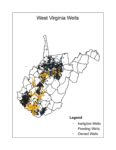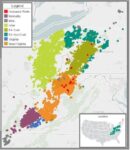|
|||||||||||
|
Note: Because of coronavirus we could not do a timely spring, hard copy newsletter. Here is an unusually long update/eNewsletter to take its place. CONTENTSPlugging priority bill passed! Orphaned well prevention bill died Thank you — Thank them — Ask for more! Supreme Court decision on “partition” lawsuits rules for small mineral interest owners. Membership of Oil and Gas Conservation Commission Implementation of WVU studies to protect surface owners Vote! There is a safe way to do it even in a pandemic ORPHANED WELLS LEGISLATION!We were able to getfour orphaned well bills passed, and now signed by the Governor! Plugging money bills passed! Three of the bills generate significant money for the DEP to use in plugging orphaned wells. Although we thought they were primed and ready to pass and be signed by the Governor last year, they did not make it into law last year. But this year they passed with only 1 vote against any of the three bills. We will ask you later to thank Legislators for making this happen. The first plugging money bill is H.B. 4091. It allows drillers to get permits processed within 45 days if they pay an extra $20,000 permit application fee for the first well on a pad, and $10,000 extra for subsequent wells on the same pad (and $5,000 for a modification of an application). Seem like a lot? Remember it costs $6 Million to drill a well. Because of our advocacy on the orphaned well issue (plus that of the Farm Bureau), half of the money from these fees goes to plug orphaned wells! We do not know how drillers will use it because, although they initially were the ones who wanted the bill, they lobbied for a lower fee that they said would get used more, and drilling new wells is down. It might only be enough to plug a few orphaned wells, but we will see. Some groups favoring renewable energy and environmental protections questioned making it any easier or faster to drill wells, but after weighing any small benefit to the industry against the environmental problems with orphaned wells, they eventually decided not to object. The second plugging money bill is H.B. 4090. The conventional well operators are having a tough time since the horizontal shale well tsunami hit. They are not drilling new wells and their existing wells naturally produce less each year. They initially wanted a bill passed to eliminate the 5% severance tax on their “low producing” wells. Because of our advocacy (and that of the Farm Bureau) the bill reduces the severance tax on gas wells producing less than 60 MCF a day to 2.5% and dedicates all of that (except a little that goes to counties) to plugging orphaned wells. It is estimated this could generate enough money to plug 40 or 50 wells a year once it gets going, but fewer over time as production from these wells decreases. The third plugging money bill is the bill WVSORO put forward, H.B 4088. While the operators did not oppose it, we were pretty much on our own getting it passed. There is money being held in the Circuit Clerk’s offices for missing and unknown royalty owners from partition suits and from missing/unknown mineral owner lease suits. In the case of the partition suits, the money would just have sat there forever. Now after seven years the money will go to plug orphaned wells. In the case of the missing/unknown owners leasing suits, the first seven years of that royalty money will now go to plug orphaned wells, including money that has already been held for seven years. After that, as was the case before, title to the minerals and all future royalties goes to the surface owner! We asked the Legislature to give the surface owners with well pads etc. on them all the money and to give half the first seven years’ money to surface owners with undisturbed lands above horizontal well bores. We did that as a result of a poll we took of our members. However, the House sponsors wanted it the way it turned out. We told the Senate what we wanted, but we were afraid to put up too much of a fight because it could cause the bill to die, and so the Senate did what the House passed. The good news is that H.B. 4088 could be enough money to plug 100 or 200 wells in the first couple years! The bad news is that in future years this could drop sharply as the 2018 “cotenancy” bill reduces the number of both kinds of suits the drillers will file. The good news is that WVSORO and the Farm Bureau got a provision in that cotenancy bill in 2018 that says half of the missing and unknown owners royalty money generated by that statute will go to plug orphaned wells starting in 2023. The rRenewable energy and other environmental protection folks advocates were concerned that the DEP staff time needed to make all of this plugging happen would take away from staff time for enforcement, which we agree is badly needed. We made sure that some of this money can be used to hire the staff necessary to make all of this plugging happen, and they stepped aside. Plugging priority bill passed! A fourth orphaned well bill can help you get an unplugged well on your land plugged. It was a bill that was mostly our bill though on this one the Farm Bureau was helpful too. Here’s how it works.
then the forfeited bond money for the well on your land has to first go to plug the well on your land, even if your well is not at the top of the DEP’s priority list that DEP otherwise would have to follow. The hard part may be getting the DEP to forfeit the bond. So you might want to call us if you complain to the DEP and nothing gets done. We might be able to help. Orphaned well prevention bill died. Sadly, even with the money from all three of these bills and the 2018 cotenancy bill, it will be decades before the current 4,500 current orphans get plugged. In addition there are 8,000 more unplugged (“abandoned”) wells that have not produced in a year that may soon become orphans. In addition to that there may be thousands and thousands more according to a company called Diversified. That company is buying up low producing conventional wells (that aren’t unplugged “abandoned” wells yet) from big companies that are now drilling horizontal wells. According to this company’s published projections to their investors in Great Britain, that company will run out of money to plug its wells in about 15 years leaving 10,000 more that may also become orphaned wells. Similarly sadly, the bill that was intended to stop more wells from becoming orphans in the future, SB 82 and HB 4827, did not move at all. These bills would have, among other things, started requiring the drillers to set aside money in the treasury as soon as each well starts to produce to be held there to pay to plug that well when the time comes. It would also have put limits on transferring wells from companies who could afford to plug the wells to companies that cannot afford to plug the wells. THANK YOU. THANK THEM. ASK FOR MORE.We have always said that the founding fathers, in order to make it hard to pass a bad bill, made it hard to pass any bill. It usually takes three years to get a bill passed. The industry wanted or did not oppose the bills that passed. There were other bills we wanted that the industry blocked. So first, we sent out several alerts asking you members of WVSORO to support the bills that passed by calling or sending emails to legislators. And you did! And it made a difference! Only 1 “no” vote on any of the bills! So from those of us working at the Capitol, and from your fellow surface owners, thank you, thank you, thank you! Second, please contact your legislator and thank them for voting for the bills. It is the polite thing to do AND it will let them know you are watching . . . And third, at the same time you thank them for what they did in the last legislative session, tell them you would like their help next year passing legislation to prevent future orphaned wells and passing other legislation for surface owners. To reach out to the members of the Senate, click here. To reach members of the House of Delegates, click here.
Special thanks to the sponsors of the orphaned well prevention bills:
Thanks go to the following committee chairman who put one or more of the bills that passed on their committee’s agendas:
These legislators sponsored one bill or another: Senators Facemire (representing Braxton, Clay, Harrison and Lewis counties), Hamilton (representing Pendleton, Pocahontas, Nicholas, Randolph, Upshur and Webster counties) Jeffries (representing Kanawha and Putnam counties), Romano (representing Braxton, Clay, Harrison and Lewis counties), Rucker (representing Berkeley and Jefferson counties) and Smith (representing Barbour, Grant, Hardy, Taylor, Tucker, and Preston counties), On the other hand Governor Justice and Senate President Carmichael (representing Jackson, Mason, Putnam and Roane counties) helped the industry as opposed to helping us. Supreme Court decision on “partition” lawsuits rules for small mineral interest owners.West Virginia Supreme Court has ruled that oil and gas mineral interests with shared ownership cannot be the subject of partition suits! When horizontal shale drilling first began, drillers would threaten to file partition suits against mineral owners who shared ownership of a mineral tract with other family members and who did not want to sign the leases at all, or on the terms offered by the driller. And frequently the drillers would actually bring these suits. Most people are intimidated by law suits or even the threats of lawsuits. So the driller’s bullying using partition suits often was successful in working to the unfair advantage of the driller. The new “cotenancy” statute that passed in the 2018 Legislature reduced the number of partition suits filed. The cotenancy statute said that if the driller was able to get the owners of 75% of the interests in a mineral tract to sign leases, then the driller could go ahead and drill — and the other 25% would be deemed to have signed leases with some of the best provisions in the signed 75% of leases. (If you want to know more about the cotenancy statute, read our page on the cotenancy statute.) So the passage of the cotenancy law reduced the drillers needs to file, or threaten to file, partition suits. If they got 75% signed up, they did not need to use partition because they could go ahead and drill. However, partition threats are still being made and suits are still filed if the driller cannot get to 75% leased or if the driller did get to 75%, but thinks it would be cheaper to bring the suit than to pay to the 25% holdouts the royalty rates etc. in the leases signed for the 75%. Fortunately, the West Virginia Supreme Court has ruled that mineral interests cannot be subject to partition suits because, “The forced sale of oil and gas minerals precludes the owner the benefit of lease consideration [the signing bonus] and the prospect of production proceeds [royalties for gas and natural gas liquids], which represent the primary and perhaps the exclusive value which such ownership vests.” So the interest of the other person or persons being sued will be prejudiced. To read more about partition and the West Virginia Supreme Court’s case go to our web page on the subject. If you have been sued or threatened with a partition suit, it is very important for you to go there. Miscellaneous InformationMembership of Oil and Gas Conservation Commission You may recall that back in October we blasted the Governor because he appointed a purely industry person as the “public” member of this Commission. This Commission decides forced pooling of deep strata (like the Utica), and settles some disputes if the drillers use the cotenancy statute. The industry introduced a bill to change the requirements for the chairperson of the Commission so its decisions could not be challenged because the person they got appointed to that chairperson position does not exactly meet the requirements. We got that bill amended to make sure that the public member would really represent the public. The bill died. We plan to come back next year to fix the public member qualification. In the meantime, we may be able to provide a free lawyer to challenge anything the Commission does that we would not like on the grounds that neither the Chairman nor the public member are qualified for their positions! Keep an ear out and let anyone know who might light that help. Implementation of WVU studies to protect surface owners The recommendations to protect surface owners, recommendations that were made by WVU studies after the passage of the 2011 Horizontal Well Act authorized the studies, have never been implemented. Read about this on our website. On the other hand, because of the Crowder decision of the West Virginia Supreme Court (in which WVSORO filed a “friend of the court” amicus brief), surface owners now can just in almost every case refuse to let a well pad be drilled on them — unless they get the protections (and money) they want. WVSORO has a web page on what the surface owner should ask for in terms of protections (and money!). The question we have now is whether we should quit asking the Legislature to pass legislation to implement the recommendations because we are worried that the Legislature would end up passing some sort of compromise bill that is weaker than the WVU recommendations. Weaker legislation might make it tougher for the surface owner to negotiate for all of the protections WVU recommended. Or should we continue to push for implementation of the studies by the Legislature because surface owners may not know about the WVU studies and their post-Crowder enhanced bargaining leverage; so it would be better to make sure they all got compromise protections rather than leave them to their own devices negotiating with the drillers? If you have a thought on that, let us know. We may also conduct a poll later. Vote! There is a safe way to do it even during a pandemicThe more legislators we have who have more appreciation of our problems (as opposed to appreciation of the industry’s campaign donations) the better off we are next year and beyond. Vote in this May primary election and the general in November! You can vote despite the coronavirus by using “absentee” voting. We heard a rumor that If you are already registered to vote, you will automatically get an application in the mail to vote by absentee ballot so you can stay home and vote. If (when) you do, fill it out and send it back. Next Then you will then get sent an absentee ballot in the mail which you can fill out, sign and send back to complete voting. More information here: All Registered West Virginia Voters Can Cast Absentee Ballots In Primary Election Due To COVID-19 It’s going to take a little patience: Q&A on absentee voting during a state of emergency Take care of yourselves!Stay home. If and when you have to go out, use social distancing, wash your hands frequently, and avoid touching your face. We need you!Donate!!!Most of our money comes from membership and donations. If you have not already renewed your membership, or if you just want to send us an extra donation, click here. |
|||||||||||
WV Surface Owners' Rights Organization © 2016
Frontier Theme










